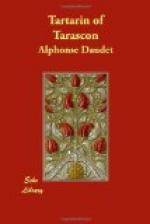III. An Invocation to Cervantes — The Disembarkation — Where are the Turks? — Not a sign of them — Disenchantment
O Miguel Cervantes Saavedra, if what is asserted be true, to wit, that wherever great men have dwelt some emanation of their spirits wanderingly hovers until the end of ages, then what remained of your essence on the Barbary coast must have quivered with glee on beholding Tartarin of Tarascon disembark, that marvellous type of the French Southerner, in whom was embodied both heroes of your work, Don Quixote and Sancho Panza.
The air was sultry on this occasion. On the wharf, ablaze with sunshine, were half a dozen revenue officers, some Algerians expecting news from France, several squatting Moors who drew at long pipes, and some Maltese mariners dragging large nets, between the meshes of which thousands of sardines glittered like small silver coins.
But hardly had Tartarin set foot on earth before the quay sprang into life and changed its aspect. A horde of savages, still more hideous than the pirates upon the steamer, rose between the stones on the strand and rushed upon the new-comer. Tall Arabs were there, nude under woollen blankets, little Moors in tatters, Negroes, Tunisians, Port Mahonese, M’zabites, hotel servants in white aprons, all yelling and shouting, hooking on his clothes, fighting over his luggage, one carrying away the provender, another his medicine-chest, and pelting him in one fantastic medley with the names of preposterously-entitled hotels.
Bewildered by all this tumult, poor Tartarin wandered to and fro, swore and stormed, went mad, ran after his property, and not knowing how to make these barbarians understand him, speechified them in French, Provencal, and even in dog Latin: “Rosa, the rose; bonus, bona, bonum!” — all that he knew — but to no purpose. He was not heeded. Happily, like a god in Homer, intervened a little fellow in a yellow-collared tunic, and armed with a long running-footman’s cane, who dispersed the whole riff-raff with cudgel-play. He was a policeman of the Algerian capital. Very politely, he suggested Tartarin should put up at the Hotel de l’Europe, and he confided him to its waiters, who carted him and his impedimenta thither in several barrows.
At the first steps he took in Algiers, Tartarin of Tarascon opened his eyes widely. Beforehand he had pictured it as an Oriental city — a fairy one, mythological, something between Constantinople and Zanzibar; but it was back into Tarascon he fell. Cafes, restaurants, wide streets, four-storey houses, a little market-place, macadamised, where the infantry band played Offenbachian polkas, whilst fashionably clad gentlemen occupied chairs, drinking beer and eating pancakes, some brilliant ladies, some shady ones, and soldiers — more soldiers — no end of soldiers, but not a solitary Turk, or, better to say, there was a solitary Turk, and that was he.




